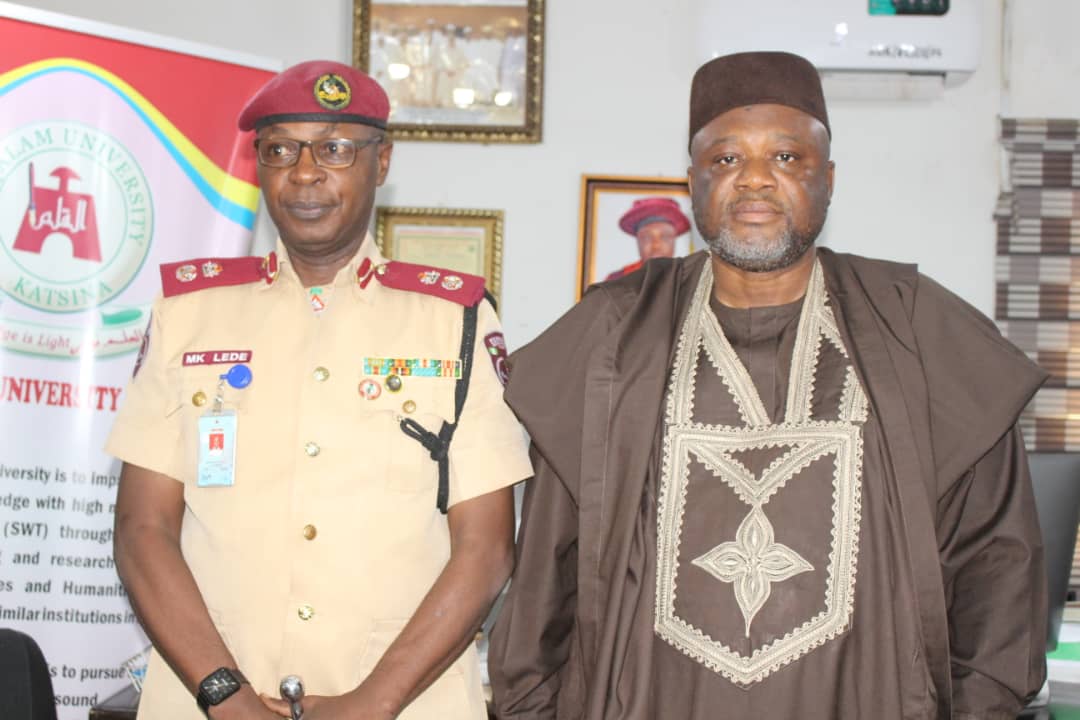FRSC SECTOR COMMANDER KATSINA SEEKS STRATEGIC COLLABORATION WITH AL-QALAM UNIVERSITY

In a renewed drive for inclusive and sustainable road safety administration, the Sector Commander of the Federal Road Safety Corps (FRSC), Katsina Sector Command, Corps Commander Maxwell Kaltungo Lede, paid a courtesy visit to the Vice Chancellor of Al-Qalam University, Professor Nasiru Musa Yauri on Thursday, 7th July, 2025. The high-level engagement, held at the university’s main campus in Katsina, was aimed at fostering institutional collaboration for enhanced road safety advocacy, education, and research.
Upon arrival, Corps Commander Lede was warmly received by the Vice Chancellor alongside members of the university's top management team. The meeting featured robust deliberations on how academic institutions can serve as critical partners in advancing road safety awareness and implementation strategies.
In his address, Commander Lede emphasized that road safety is not merely a transportation issue but a major global public health challenge, as classified by the World Health Organization (WHO). He reiterated that addressing this challenge requires an inclusive, multi-sectoral approach involving all critical stakeholders — including higher institutions of learning.
“Nigeria has aligned with the global agenda on road safety through the National Road Safety Strategy (NRSS), a comprehensive policy framework designed to drive sustainable safety outcomes across the nation’s highways. Our collective aspiration is to position Nigerian roads among the safest globally by the year 2030. This can only be achieved through strategic collaborations with institutions like Al-Qalam University,” Lede stated.
Highlighting areas of possible collaboration, Commander Lede proposed several initiatives, including joint research and development on road safety issues, professional drivers’ training programmes, and public enlightenment campaigns targeting both students and staff. He further invited the university community to contribute actively by enrolling as Special Marshals — a volunteer arm of the FRSC with powers to enforce traffic laws and promote road safety.
The Commander also demonstrated the newly launched FRSC Mobile Application, explaining its features as a user-friendly, one-stop digital platform for accessing a range of FRSC services. He encouraged the university to leverage the app for road safety education and reporting, noting its significance in promoting transparency, efficiency, and public engagement.
In his response, Professor Yauri commended the FRSC for its steadfast commitment to reducing road traffic crashes through both routine operations and special intervention strategies. He acknowledged that while the Corps has made commendable progress, public indiscipline remains a major obstacle to safer roads.
“The university recognizes the strategic importance of road safety and the role of institutions in shaping public behavior and policy. We are ready to collaborate with the FRSC across all proposed areas and beyond, particularly in advancing public education, behavioural change, and evidence-based policymaking,” the Vice Chancellor affirmed.
He further assured the FRSC leadership of the university’s unwavering support in fostering a culture of safety, responsibility, and civic engagement among its academic community and the larger society.
This landmark engagement signals a forward-thinking model of partnership between government agencies and educational institutions, reinforcing the national drive towards achieving the Sustainable Development Goal (SDG) target of halving road traffic deaths and injuries by 2030.

